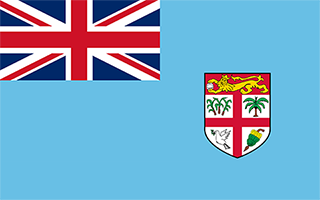Facts and Data
Webpages:
Official Unesco Page
Basis Data:
Unesco World heritage since: 2013
Size of heritage: 70 ha
- Buffer zone: 363 ha
Coordinates:
Longitude: 178,835°
Latitude: -16,317°
Summary
The town and its low line of buildings set among coconut and mango trees along the beach front was the first colonial capital of Fiji, ceded to the British in 1874. It developed from the early 19th century as a centre of commercial activity by Americans and Europeans who built warehouses, stores, port facilities, residences, and religious, educational and social institutions around the villages of the South Pacific island’s indigenous population. It is a rare example of a late colonial port town that was influenced in its development by the indigenous community which continued to outnumber the European settlers. Thus the town, an outstanding example of late 19th century Pacific port settlements, reflects the integration of local building traditions by a supreme naval power, leading to the emergence of a unique landscape.
Location on Map
Show bigger map on Openstreetmap
Levuka Historical Port Town: A UNESCO World Heritage Site in Fiji
Located at coordinates S17 41 0.16 E178 50 4.32, Levuka Historical Port Town is a remarkable UNESCO World Heritage site in Fiji. This small town, situated on the eastern coast of the island of Ovalau, holds immense historical and cultural significance for the nation and the Pacific region as a whole.
History
Levuka was established in 1820 as the first colonial capital of Fiji, serving as a hub for European traders and settlers. The town quickly flourished, attracting merchants from around the world, including America, Australia, and China. Its strategic location made it a vital port for ships traveling across the Pacific Ocean.
During the late 19th century, Levuka became a melting pot of cultures, with a diverse population that included indigenous Fijians, Europeans, Chinese, and Pacific Islanders. This multicultural environment fostered a unique blend of traditions, architecture, and social practices that are still evident today.
Levuka played a crucial role in Fiji's political history. It served as the capital of the British colony of Fiji from 1874 until 1882 when the capital was moved to Suva. The town was also a center for education, with the establishment of the first secondary school in Fiji, the Levuka Public School, in 1879.
Current State
Today, Levuka Historical Port Town stands as a testament to its rich past. The town's architecture reflects the diverse influences it has experienced over the centuries. Visitors can explore the well-preserved colonial buildings, including the Royal Hotel, the Levuka Town Hall, and the Sacred Heart Church, which showcase a blend of European and Pacific Island architectural styles.
The town's layout remains largely unchanged since its establishment, with narrow streets and a grid pattern that reflects its early planning. The waterfront area, once bustling with ships and traders, still retains its historic charm, offering visitors a glimpse into Levuka's maritime past.
Levuka's cultural heritage is also celebrated through various festivals and events. The Fiji Day celebrations held in October each year commemorate the town's role as the first capital of Fiji. The Levuka Festival, held biennially, showcases traditional Fijian music, dance, and crafts, providing a vibrant display of the local culture.
Efforts have been made to preserve and protect Levuka Historical Port Town. In 2013, it was inscribed as a UNESCO World Heritage site, recognizing its outstanding universal value. The Fijian government, in collaboration with local communities and international organizations, has implemented conservation measures to safeguard the town's heritage for future generations.
Levuka Historical Port Town stands as a living testament to Fiji's colonial past and its cultural diversity. Its UNESCO World Heritage status ensures that this unique site will continue to be cherished and appreciated by visitors from around the world, offering a glimpse into Fiji's rich history and vibrant cultural heritage.
